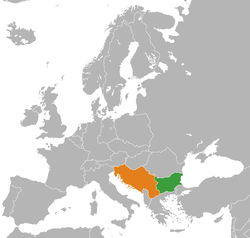Bulgaria–Yugoslavia relations
Bulgaria |
Yugoslavia |
|---|---|
 | |
Bulgaria |
Yugoslavia |
|---|---|
Bulgaria |
Yugoslavia |
|---|---|
Bulgaria–Yugoslavia relations were historical foreign relations between Bulgaria (both Kingdom of Bulgaria 1908–1946 and the People's Republic of Bulgaria 1946–1990) and now broken up Yugoslavia (Kingdom of Yugoslavia 1918–1941 and Socialist Federal Republic of Yugoslavia 1945–1992). Despite some substantial unification proposals in the aftermath of the World War II, Bulgarians were the only South Slavic nation which did not join the Yugoslav (lit. 'South Slav') federation.
History
Interwar period
While there were close ethnic, historic, linguistic and religious links between population of Yugoslavia and Bulgaria, the two states found themselves on the opposing sides in the period after the end of
World War II
During
Cold War period

After the interwar kingdom was only partially successful in creation of
Relations after 1948 Tito-Stalin split
While the Bulgarian Communist Party needed Soviet support to gain the power in the country, the League of Communists of Yugoslavia was in a position to independently establish effective control over the country already in 1945. This led new Yugoslav authorities to expect the status of an ally instead of a satellite state within the Eastern Bloc. The situation escalated in response to the 1948 Tito–Stalin split after which Yugoslav relations with all Eastern Bloc countries, including Bulgaria, were either suspended or significantly strained. Yugoslavia then reoriented its policy towards the close cooperation with Non-Aligned countries.
At the end of the 1970s and the beginning of 1980s popular culture from Yugoslavia, and particularly from the Socialist Republic of Serbia served Bulgarian citizens as a window to the West through which entertainers and other cultural content entered the country.[3]
See also
- Bulgaria–Croatia relations
- Bulgaria–Kosovo relations
- Bulgaria–Montenegro relations
- Bulgaria–North Macedonia relations
- Bulgaria–Serbia relations
- Bulgaria–Slovenia relations
- First Balkan War
- Dissolution of the Ottoman Empire
- Dissolution of Austria-Hungary
- Serbo-Bulgarian War
- Bulgaria at the 1984 Winter Olympics
- Group of Nine
- Bulgaria–Soviet Union relations
References
- ^ a b Sheperd, David (1968). Relations between Yugoslavia and Bulgaria, 1918–1941 (Master Thesis). Durham University. Retrieved 9 January 2021.
- OCLC 86068902.
- ^ Friedrich Ebert Stiftung. Retrieved 9 January 2021.



